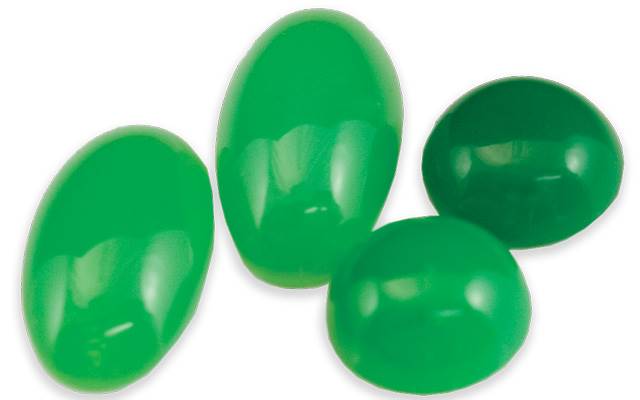Chrysoprase is one of the rarest and most valuable forms of chalcedony, which is a cryptocrystalline variety of quartz. It is coloured green by traces of nickel and its name derives from the Greek words chrysos, meaning gold, and prasos, meaning leek.
In its finest form, this bright green ornamental gemstone has a glowing, ethereal quality.
Chrysoprase possesses a soft translucence similar to an opal and an intense colour rivalling that of imperial Burmese jade; however, don’t be fooled, as it is a distinctly different mineral with unique properties.
Chrysoprase is prized for its bright, even colour and texture. These qualities are partly due to a cryptocrystalline structure that means it is composed of crystals so fine they can’t be seen under normal magnification.
Its colour varies from light, minty apple- green to intense deep rich green. It is usually translucent but may be opaque in lower- quality material.
Australia provides almost the entire world’s production of quality chrysoprase. Smaller amounts originate from Brazil, the US, Russia, Africa and the Malagasy Republic.

Australian deposits can be found in Western Australia and South Australia but the finest quality chrysoprase originates from the Marlborough district in Queensland.
Marlborough’s geological environment combined with a uniquely high nickel content of 2.35 per cent imparts a deeper, richer colour than other localities, resulting in beautiful and even bright yellow to green colour version of the gemstone.
Chrysoprase was discovered in Marlborough in the early 1900s and commercial mining commenced in the 1960s. The rough is mined mostly by hand, washed and then sorted, with some mechanised machinery available.
A great deal of Marlborough material previously exported to the People’s Republic of China for domestic consumption developed a following as a jade substitute, leading to the misnomer ‘Australian jade’. Today, chrysoprase is in high demand within the Asian market.
Chrysoprase’s cool, soothing colour and versatility is an inspiration for many designer- jewellers.
Peter Carl Fabergé, the famous Russian jeweller of the 19th century, often employed chrysoprase in his virtuoso creations.
Queen Anne of England also favoured chrysoprase in the 18th century and its popularity continued throughout Queen Victoria’s reign.
More recently, American and European jewellery houses like Louis Vuitton, Tiffany & Co and Piaget have showcased this gemstone. Some of these jewellery pieces have adorned red carpet celebrities including Julia Roberts, Naomi Watts and Julia Louis-Dreyfus.
Chrysoprase’s toughness, hardness (7 on Mohs scale), excellent durability and ability to take a fine polish make it ideal for a range of cutting styles.
The finer material is typically cut into cabochon while beads and tumbled gemstones are cut from lower-grade material. Also popular are gemstone carvings such as ornamental objects, cameos, intaglios, seals and insignia.
Be mindful that chrysoprase can dehydrate and fade if exposed to prolonged direct sunlight; however, this is remedied by soaking it in water.
FACT SHEET
 Hardness: 7 on Mohs scale
Hardness: 7 on Mohs scale
Belongs to variety of: Microcrystalline quartz (chalcedony)
Found: Australia, Brazil, the Ural Mountains and California
VIEW JEWELLER MOOD BOARD